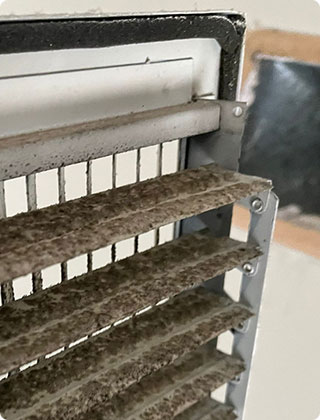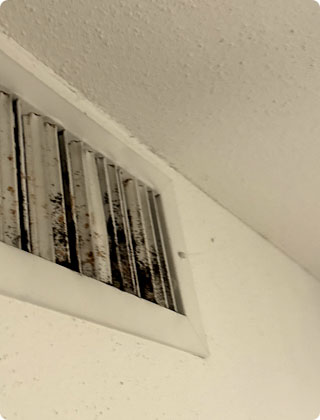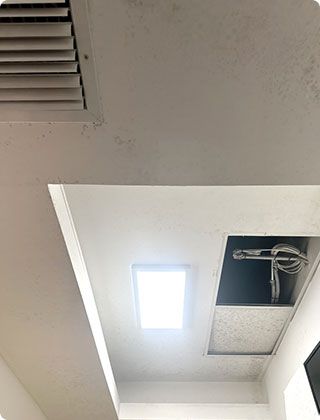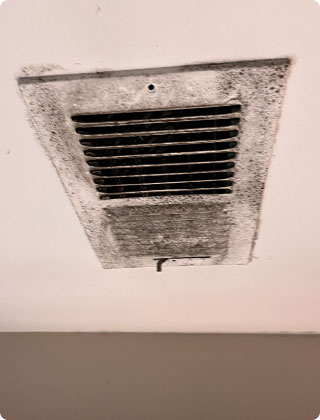
Wet Dog Smell Coming from Vents
Have you noticed a strange, musty odor in your home - something like a wet dog smell or even wet socks? While it might seem like a minor nuisance, this kind of odor can be an early warning sign of a more serious issue: hidden mold growth or moisture buildup in your HVAC system.
These smells often go beyond surface-level problems. They can indicate mold colonies thriving behind walls, under flooring, or inside air ducts - places you can't easily see. That's where O2 Mold Testing comes in. We specialize in professional mold inspection and testing, helping homeowners identify the source of odors and assess indoor air quality before the problem escalates.
We'll explore what causes these unpleasant smells, when to be concerned, and how accurate mold testing can give you the answers you need to take the next step - whether that's remediation or prevention.
What Does a 'Wet Dog Smell' in Your Home Really Mean?
If your home smells like a wet dog, especially when the air conditioner is running or after a rainy day, it's more than just an unpleasant odor - it could be a sign of hidden mold or excess moisture. This type of smell is often described as musty, damp, or earthy, and it's commonly associated with mold spores growing in places you can't easily see.
Mold thrives in dark, humid environments - behind drywall, under carpets, inside HVAC systems, or around leaky plumbing. Over time, it releases microbial volatile organic compounds (MVOCs), which are responsible for that distinctive mildew smell or wet dog odor.

Common Causes of Wet Dog Smell in Homes:
- Leaky pipes or roofs creating hidden moisture pockets
- Poor ventilation in bathrooms, basements, or crawl spaces
- Condensation buildup in HVAC systems or ductwork
- Water damage that was never properly dried or treated
If you've tried cleaning, deodorizing, or replacing filters and the smell still lingers, it's time to consider a professional mold inspection. At O2 Mold Testing, we use advanced tools to detect mold even when it's not visible - helping you pinpoint the source of the odor and understand the extent of the issue.
Why Does My AC Smell Like Wet Socks?
If you've ever turned on your air conditioner and noticed a smell that reminds you of wet socks or dirty laundry, you're not imagining things. This common issue - often called the "dirty sock syndrome" - is usually caused by mold or bacteria buildup inside your HVAC system.
When moisture accumulates on the evaporator coil or in the drain pan, it creates the perfect environment for microbial growth. As your AC circulates air through the system, it can spread that musty, sock-like odor throughout your home.

Common Causes of Wet Sock Smell in AC Units:
- Clogged or dirty air filters
- Standing water in the drain pan
- Mold or mildew on the evaporator coil
- Poor ventilation or high indoor humidity
These smells are more than just unpleasant - they can be a sign that your system is circulating contaminated air, which may affect your health over time. If your AC smells bad when it turns on, it's a good idea to schedule a mold inspection to determine whether mold is present in your HVAC system or ductwork.
At O2 Mold Testing, we offer non-invasive mold testing that can detect spores in the air and on surfaces, helping you understand whether your AC is contributing to poor indoor air quality.
Health Risks of Mold in Your HVAC System
When mold grows inside your HVAC system, it doesn't just make your home smell bad - it can also pose serious health risks. As your system circulates air, it may also be spreading mold spores, bacteria, and allergens throughout your living space.
Common Health Effects of Mold Exposure:
Even if you don't see visible mold, symptoms like these - combined with a persistent musty odor - can be a red flag. Mold in your HVAC system is particularly concerning because it can go undetected for months while continuously affecting your indoor air quality. Some of the symptoms can be:
- Respiratory issues such as coughing, wheezing, or shortness of breath
- Allergic reactions like sneezing, itchy eyes, and skin irritation
- Asthma flare-ups, especially in children or the elderly
- Chronic fatigue and headaches in mold-sensitive individuals
That's why professional mold testing is so important. At O2 Mold Testing, we help homeowners identify whether mold is present in their air ducts, vents, or other hidden areas. Our detailed reports give you the information you need to take action - whether that means remediation or simply improving ventilation and moisture control.
How O2 Mold Testing Can Help
If your home smells like wet dog, wet socks, or musty air, and you suspect mold might be the cause, the first step is to get a clear diagnosis. That's where O2 Mold Testing comes in.
We specialize in professional mold inspection and testing, so our assessments are unbiased and focused solely on identifying the presence and extent of mold in your home. Whether the odor is coming from your vents, walls, or HVAC system, we use advanced tools like:
- Air sampling to detect airborne mold spores
- Surface testing to identify mold on walls, ceilings, or ductwork
- Moisture mapping to locate hidden damp areas that promote mold growth
Our detailed reports provide lab-certified results and clear recommendations, so you can take the right next steps - whether that's hiring a remediation company or improving ventilation and moisture control.
Why Choose O2 Mold Testing?
- Fast, reliable, and non-invasive testing
- Certified mold inspectors with local expertise
- Serving homeowners, renters, and property managers

Prevention Tips to Keep Mold (and Odors) Away
Once you've identified and addressed a mold issue, the next step is making sure it doesn't come back. Mold thrives in moist, poorly ventilated environments, so prevention is all about controlling humidity, improving airflow, and staying proactive with maintenance.
Simple Tips to Prevent Mold and Musty Odors:
- Change HVAC filters regularly (every 1-3 months)
- Use a dehumidifier in damp areas like basements or laundry rooms
- Keep vents and air ducts clean with routine inspections
- Fix leaks quickly, whether from plumbing, roofing, or condensation
- Ensure proper ventilation in bathrooms, kitchens, and attics
Even if your home smells fresh now, mold can return if the underlying conditions aren't addressed. That's why it's smart to schedule periodic mold testing, especially if you live in a humid climate or have had water damage in the past.
At O2 Mold Testing, we help homeowners stay ahead of potential problems with routine mold inspections and air quality assessments - giving you peace of mind and a healthier home environment.
Don't Ignore That Wet Dog Smell
A persistent wet dog smell, musty odor, or wet sock scent in your home is more than just unpleasant - it's a potential warning sign of hidden mold or HVAC issues that could impact your health and comfort. Whether the smell is coming from your vents or AC unit it's important to take it seriously.
The good news? You don't have to guess. With professional mold inspection and testing from our specialists, you can get clear, lab-backed answers about what's really going on in your home. Our certified inspectors use advanced tools to detect mold in the air and on surfaces - so you can take the right steps to protect your home and your health.
Ready to find out what's behind that smell?
Contact O2 Mold Testing today to schedule your mold inspection and breathe easier knowing your home is in expert hands.


